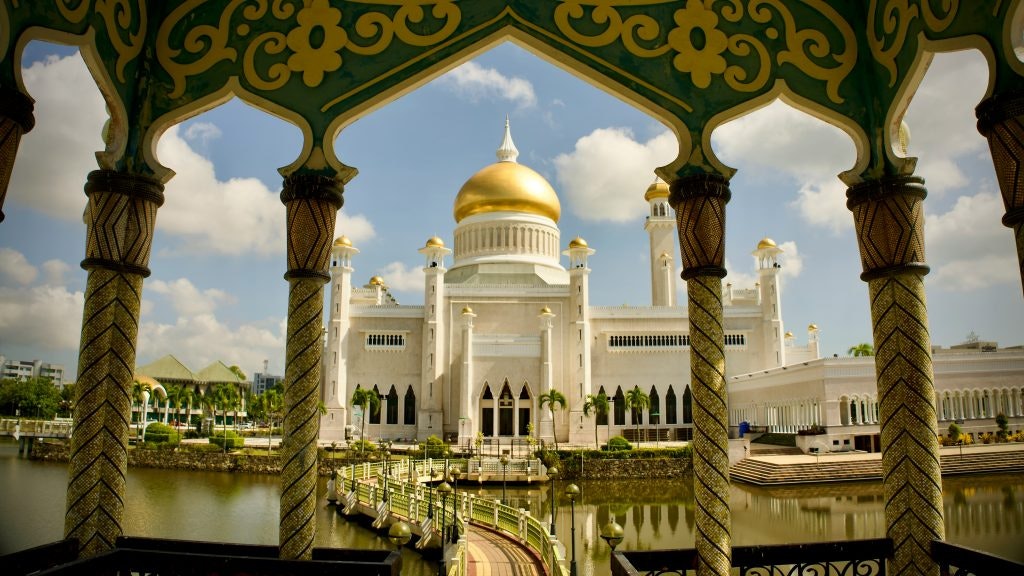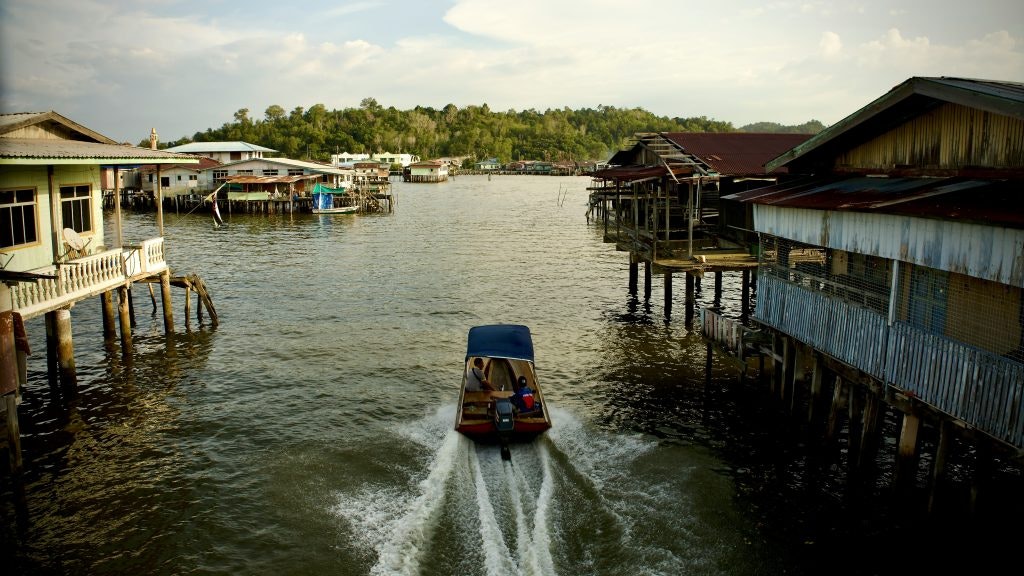







Brunei is a small country in Southeast Asia on the northern coast of Borneo. It shares a border with Malaysia and has a coastline along the South China Sea. The capital is Bandar Seri Begawan, and the official language is Standard Malay.
Brunei has a tropical climate and large areas of rainforest. Its economy depends on oil and gas, and the Sultan is both the head of state and government.
Travel close to Brunei and explore one of its neighbors: Thailand.
Take a look at these key facts about Brunei:
| Key Facts About Brunei | Details |
| Population | 465,833 |
| Currency | Brunei Dollar |
| Area | 2,226 sq mi (5,765 sq km) |
| GDP | ~$17 billion |
| Main Religion | Islam (~83% of the population) |
| Literacy Rate | 97.21% |
Here are some 12 fun facts about Brunei, including its history, economy, and daily life.
Local lore holds that when Awang Alak Betatar first landed on present-day Brunei, he exclaimed: “Baru nah” which means “that’s it!” The name Brunei was derived from these two words. Having established his dynasty in Brunei, Betatar was renamed as Sultan Muhammad Shah. Just so you know, the actual full name of Brunei is Negara Brunei Darussalam, where “negara” means “country” and “darussalam” means the “abode of peace.”
Brunei is a Malay Islamic monarchy. The Sultan of Brunei is the head of state and government. As Sultan of Brunei, Hassanal Bolkiah is the absolute monarch of the nation. Hassanal Bolkiah serves as the Prime Minister, Defense Minister, Finance Minister, and Minister of Foreign Affairs and Trade. He has full executive authority. Hassanal Bolkiah ascended to the throne on October 5, 1967. With over 56 years of rule, he is now the world’s longest-reigning incumbent monarch.
Although Brunei does have a legislative council, no elections have been held in the past several decades. Brunei is one of the two remaining absolute monarchies in Asia, along with Saudi Arabia. The legal system of the country is based on both English common law and Islamic Sharia law, with the latter often superseding the former in critical cases.
The Istana Nurul Iman is the formal residence of the Sultan of Brunei. It also serves as the seat of the government of Brunei. Istana Nurul Iman is located in a picturesque landscape on the banks of the Brunei River, in the capital city of Bandar Seri Begawan.
The total floor space of the palace is about 2,152,782 square feet (200,000 square meters). This makes Istana Nurul Iman the world’s largest residential palace as per the Guinness World Records. The palace has 1,788 rooms. It includes 257 bathrooms, a mosque, a garage with space for 110 cars, and 5 swimming pools.
Do you pump gas at a Shell station? Much of Shell’s oil comes from offshore drilling platforms in Brunei. To say that the oil and gas industry is vital to the economy of Brunei is an understatement. Brunei ranks among the smallest countries in the world, with a land area of about 5,765 square kilometers. Yet Brunei has approximately 1.1 billion barrels of proven oil reserves and about 15.2 trillion cubic feet of proven natural gas reserves.
While abundant, this oil and gas was not easy to come by. The first oil well in Brunei was drilled in 1899 by the company that later became Brunei Shell Petroleum. But it was not until 1929 that a productive oil field was found, in Seria, and it was three years later in 1932 that the first export of crude oil happened. Gas exports took much longer. The first liquefied natural gas plant was constructed in 1972, and in the following year began exporting LNG to Japan and Korea. The production of crude oil and natural gas now accounts for 90% of Brunei’s economy. Even so, Brunei is only the 3rd largest producer of oil and gas among Southeast Asian nations.
The onshore oil field at Seria in Brunei is one of the country’s most important oil fields. In 1991, a monument called the Billionth Barrel Monument was built there to celebrate the Seria oilfield’s billionth barrel of oil.
Given its relatively small population of fewer than half a million people, Brunei has a high GDP per capita making it one of the wealthiest nations in the world. This high GDP per capita, in turn, offers the people of Brunei a wide range of social and economic benefits. For example:
The British were involved in multiple conflicts in Brunei throughout the 19th and 20th centuries, effectively taking control at various points. Eight days after the attack on Pearl Harbor, which led to the Americans entering the Second World War, the Japanese attacked and successfully occupied Brunei to secure a source of oil. Brunei was occupied by Japan from 1941 to 1945, when World War II ended. As the Japanese retreated, they set fire to the oil field at Seria.
Although the Federation of Malaysia—including Brunei’s neighbors of Sarawak and Sabah—was formed in 1963, Brunei did not gain independence from Great Britain until January 1, 1984. This national holiday commemorates Brunei’s independence from the United Kingdom, with diverse cultural events and festivities held throughout the country.
Despite the pressures of development in this oil-rich nation, Brunei boasts a 70% conservation rate of its rainforests. This is generally known to be thanks to the royal family and its commitment to environmental causes. The rainforests in Brunei play a crucial role in maintaining ecological balance, regulating the climate, and providing a habitat for diverse wildlife throughout the land and in Brunei Bay.
Rainforests in Brunei provide a habitat for some of the most threatened species of flora and fauna. Brunei is home to about 121 species of mammals, 622 species of birds, and numerous reptiles, amphibians and marine fish. Notable species include the Sunda clouded leopard, proboscis monkey, hornbills, flying lizards, saltwater crocodiles, and the Bornean Sun Bear. Naturally, this makes Brunei a popular destination for eco-tourists all over the world.

Shark finning is the practice of catching a shark, cutting off its fins, and throwing the body back into the water, often while the shark is still alive. It is a cruel practice and detrimental to the survival of many species of shark.
In June 2013, Brunei became the first Asian country to ban shark finning, a move that was applauded by conservation organizations worldwide. According to this ban, no shark species could be caught or landed in the waters of Brunei Darussalam. The sale, import, and trade of any shark products was also criminalized in Brunei. Sultan Hassanal Bolkiah is credited for his commitment to biodiversity, which is said to support initiatives such as this world-leading ban.

Brunei is considered to be the most observant Islamic nation in Southeast Asia. Its only official religion is Islam. However, freedom of religion is guaranteed, as long as people practice their religion privately.
Brunei’s mosques are well-known for their beauty and elegance. Traditional and futuristic elements are perfectly blended in the architecture of these mosques. This stunning mosque architecture is characterized by intricate designs, majestic domes, and ornate minarets. Some mosques in Brunei stand on stilts on a river. Visitors are welcome inside mosques so long as its outside of prayer times and they are dressed appropriately.

Omar Ali Saifuddien Mosque in the capital city of Brunei, Bandar Seri Begawan. It is one of two national mosques and a national landmark.
Located in the capital city of Bandar Seri Begawan (formerly known as Brunei Town), this mosque features a gleaming golden dome, marble columns, and Italian-imported marble walls. Sultan Omar Ali Saifuddien Mosque uses a mixture of Mughal and Malay elements in its design. Its carpets are from Saudi Arabia and its chandeliers from Britain.
One of the largest mosques in Southeast Asia, this mosque showcases traditional Islamic architectural elements with modern touches. It includes lush gardens and reflective pools, creating a serene atmosphere for worshippers and visitors.
In 2014, Brunei passed a law making homosexuality a crime punishable by 10 years in prison. Male homosexual relations are generally subject to worse punishment than female homosexual relations. Both are subject to caning.
Caning is indeed a method of punishment for crimes in Brunei. Under the Bruneian legal system, certain behaviors considered unlawful or immoral under Islamic law are subject to corporal punishment, such as caning.
Brunei has faced criticism from various human rights organizations and international bodies for its implementation of Sharia law, particularly concerning its impact on personal freedoms and human rights.
Sharia law is primarily applied to Muslims in Brunei, while non-Muslims are subject to civil law. For example, the sale and public consumption of alcohol are illegal in Brunei, but non-Muslims can bring up to two liters into the country. To offer another example, displays of Christmas decorations, celebrations, or events that promote non-Islamic religious practices may be restricted or prohibited to adhere to Brunei’s Islamic regulations. However, non-Muslim residents and expatriates are allowed to celebrate Christmas within the privacy of their homes or places of worship.
In case you were wondering, Muslims and Christians are not permitted to marry each other.
Education is highly valued in Brunei. The country boasts a high literacy rate among its population, estimated to be 97.2 percent. There is a strong focus on promoting reading and lifelong learning. Citizens in Brunei receive free education and medical services from the government. The government invests heavily in education, providing free schooling, including at the university level, and allocating significant funds for research and innovation.
Since 1967, the Brunei dollar has been pegged to the Singapore dollar on a one for one basis. This means that the Brunei dollar and the Singapore dollar can be used interchangeably, providing stability for the currency of Brunei.
As of January 15, 2025, the Brunei dollar is approximately equivalent to 0.73 United States dollars. Also interesting: the highest value banknote in the world is the B$10,000 Brunei dollar note. It is made of polymer (not paper), and it shares the distinction of being the most valuable note with the Singapore S$10,000 note.
Often dubbed as the “Venice of the East”, the Kampong Ayer is a historical settlement on the Brunei River as it flows past the Bandar Seri Begawan city. The Kampong Ayer settlement has houses and other buildings supported by stilts standing on the water. The buildings here are interconnected by walkways and bridges, creating a contiguous settlement. Kampong Ayer is a major tourist destination in the country and provides a glimpse into traditional Bruneian village life.

Kampong Ayer, Brunei
💡 Want more trivia?
Browse all Fun Facts articles.